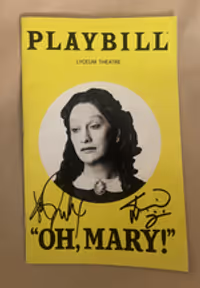Update: AIN'T NO MO extended thru December 23! Yay!
#175AIN'T NO MO to close December 18
Posted: 12/13/22 at 5:59pm
The Distinctive Baritone said: "I stand corrected. The only thing I know about marketing is what I've seen onMad Menand I guess that doesn't really apply here, ha ha."
Broadly, it's just about targeting your message to the right audience, not literally being contradictory or exclusionary within the same campaign (which I think is what you were understandably getting at).
Like, ANM has been using the phrase "Black AF" which is fantastic as a message for spaces that have a large Black audience. For spaces that are more diverse in demo (or are decidedly not typically Black), you'd want to play up the more universally relatable elements of the show.
And it's up to the research/strategy teams at the marketing agency to know where those different audiences are AND how they're mostly viewing media (social, linear/television, digital banner ads, etc.) - which also brings in the intersectionality of age, gender, and so many other factors. Race just is the obvious one here and understandably the point of a lot of this discussion re: marketing this specific show.
(Edit: paragraphs are helpful)
troynow
Leading Actor Joined: 5/2/13
#176AIN'T NO MO to close December 18
Posted: 12/13/22 at 6:03pmLEE DANIELS IS A BAD PRODUCER. and Jordan Cooper should be looking to his PRODUCER and the money RAISED to work on the show. NOT blame the marketing company or Broadway. It is called Producing. It is called Broadway.
Singingformysupper
Swing Joined: 11/7/22
#177AIN'T NO MO to close December 18
Posted: 12/13/22 at 6:08pm
I think an additional problem is there's still an unfortunate amount of people who don't want to see a man in a dress. I think they also shot themselves in the foot with the title. It took me a few weeks to realize it wasn't Ain't Too Proud.
Edit: Peaches is in pants, not a dress! But, the point of people not wanting to see someone in drag unfortunately remains.
JasonC3
Broadway Legend Joined: 4/22/21
#178AIN'T NO MO to close December 18
Posted: 12/13/22 at 6:29pm
The Distinctive Baritone said: "I guess the thing that confuses me in the article is things like Daniels saying, "We're dealing with marketing teams that don't know how to market for our demo." What does that even mean? I'm not an ad man, but marketing is marketing: billboards, print and digital ads, TV commercials...Daniels then also negatively compares their marketing to the marketing ofSomeLike It Hotby saying, "They're putting in a gazillion dollars, it seems. You see billboards everywhere. We simply don't have the budget for that." Then...why did you decide to produce the show on Broadway?
I feel bad for Cooper, as well as my old schoolmate in the cast who is making her Broadway debut. Their careers will survive I'm sure, and the show will always be a nice line on their resume. But Daniels just seems like he was in way over his head as lead producer of this thing."
Marketing is marketing on a lot of levels, but many marketers are less effective in understanding the cultural tone or ideal messaging/media placement for some demographics.
troynow
Leading Actor Joined: 5/2/13
#179AIN'T NO MO to close December 18
Posted: 12/13/22 at 7:15pm
The marketing company in question is called AKA.
Currently they are doing:
Leopoldstadt
Ohio State Murders
Piano Lesson
All "cultural shows" and yet they seem to be working out pretty well.
This scenario is/was unfortunate.
WindyWendy
Swing Joined: 6/17/12
#180AIN'T NO MO to close December 18
Posted: 12/13/22 at 7:33pm
Stupid question - I keep seeing chat about low ticket prices, but everything I see online is pricey. Where are the cheap tickets?
Anthony Sunday
Chorus Member Joined: 9/20/22
#181AIN'T NO MO to close December 18
Posted: 12/13/22 at 7:54pm
Singingformysupper said: "I think an additional problem is there's still an unfortunate amount of people who don't want to see a man in a dress. I think they also shot themselves in the foot with the title. It took me a few weeks to realize it wasn't Ain't Too Proud.
Edit: Peaches is in pants, not a dress! But, the point of people not wanting to see someone in drag unfortunately remains."
Hmm, I don't know. The marketing I've seen doesn't really address the fact that Peaches is a man in a dress. I also don't see that as an impediment to its success? Even if you wanted to argue that Black communities wouldn't take to that - you have White Chicks, Kinky Boots, the original Madea stage shows...
JasonC3
Broadway Legend Joined: 4/22/21
#182AIN'T NO MO to close December 18
Posted: 12/13/22 at 7:58pm
troynow said: "The marketing company in question is called AKA.
Currently they are doing:
Leopoldstadt
Ohio State Murders
Piano Lesson
All "cultural shows" and yet they seem to be working out pretty well.
This scenario is/was unfortunate."
Well of course I didn't assert anywhere that marketing alone determines a show's success.
There are many reasons why Leopoldstadt or either of your other examples have sold better than Ain't No Mo that have nothing to do with marketing.
InTheBathroom1
Broadway Star Joined: 10/6/18
#183AIN'T NO MO to close December 18
Posted: 12/13/22 at 8:35pm
Lee Daniels comes across as very stupid here. Excuse a after excuse for making bad business decisions. And I liked the play too.
Also, they did that $20 initiative for one day but they didn’t even have rush tickets. It’s like they weren’t even trying.
NoItAll
Understudy Joined: 1/7/13
#184AIN'T NO MO to close December 18
Posted: 12/13/22 at 9:18pm
JasonC3 said: "troynow said: "The marketing company in question is called AKA.
Currently they are doing:
…
Piano Lesson
All "cultural shows" and yet they seem to be working out pretty well.
This scenario is/was unfortunate."
Well of course I didn't assert anywhere that marketing alone determines a show's success.
There are many reasons why Leopoldstadt or either of your other examples have sold better than Ain't No Mo that have nothing to do with marketing.
"
“If people don't want to go to the picture, nobody can stop them.” Samuel Goldwyn
i would be interested to hear from anyone who has attended both ANM and Piano Lesson what differences they noticed in the general demographics (including age) between the two audiences.
I’m in California. I googled the posters put out for the two plays. If that’s all I knew, I wouldn’t be at all surprised at the results.
SouthernCakes
Broadway Legend Joined: 7/29/19
#185AIN'T NO MO to close December 18
Posted: 12/13/22 at 10:01pm
Tough to compare a classic play written by a legend with a big Hollywood star (and stacked cast) to a new play by an unknown with no stars.
NoItAll
Understudy Joined: 1/7/13
#186AIN'T NO MO to close December 18
Posted: 12/13/22 at 11:05pm
SouthernCakes said: "Tough to compare a classic play written by a legend with a big Hollywood star (and stacked cast) to a new play by an unknown with no stars."
True, but I’m not interested in the relative popularity of the plays, which is already known, but in the makeup of their audiences and how that might have been impacted by the advertising.
#187AIN'T NO MO to close December 18
Posted: 12/13/22 at 11:06pm
When I attended each, I'd say the audience was 30-50 ish.
NoItAll
Understudy Joined: 1/7/13
#188AIN'T NO MO to close December 18
Posted: 12/13/22 at 11:36pm
Jordan Catalano said: "When I attended each, I'd say the audience was 30-50 ish."
And the racial breakdowns were…? If the demographics at the two plays were similar,I’d posit that there is a general play-going audience among which there are small differences in income and education between racial groups, and that the much smaller audience for ANM is due due to the fact no group buys the notion that millions of successful Blacks have any reason to leave the country. Given the income/education bracket of the vast majority of the Broadway audience, ANM’s airplane poster looks like it’s marketing a high-priced SNL skit for White Woke Folk (alliteration AND rhyme in a 3-word phrase? Oh, yeah.).
#189AIN'T NO MO to close December 18
Posted: 12/14/22 at 2:26am
You ultimately have to blame the producer who puts the team in place and oversees the different agencies and makes decisions. They also set and manage the budget alongside the general manager.
Most shows have multiple agencies and sometimes the jobs become blurred.
- An advertising agency creates the artwork and any visual ads, writes the copy, print and digital advertising, etc. These are experts who make recommendations based on knowledge of the marketplace. Such as SpotCo or AKA.
- Marketing agency focuses on partnerships, ticket trade, community outreach, influencers, etc. Sometimes plays a role in ticket inventory alongside the GM or producer.
- Digital media agency focuses on social media. Sometimes also handles ALL online advertising (such as programmatic ads) and online video/creative content and influencers. Such as Situation Interactive or Marathon Digital.
- The Press agent oversees third-party coverage in publications: reviews, news stories, TV appearances, etc. Such as O&M or Polk & Co.
BoringBoredBoard40
Broadway Legend Joined: 9/27/21
#190AIN'T NO MO to close December 18
Posted: 12/14/22 at 2:51am
What is really weird to me is when the lead producer goes "The marketing firm just didn't get it" dude aren't you the one who picked the company, approved the plan?...its truly bizarre
#191AIN'T NO MO to close December 18
Posted: 12/14/22 at 8:23am
^Exactly. There’s only so far the “our marketing team didn’t get our show” will go, as we saw with KPOP. Lee Daniels was a producer. The first preview was a “hot ticket” with numerous stars showing up. The Smiths buy out an entire house at full price. At some point, the show itself is to blame. If it really was something special, it would have at least a cult following at this point as the other flops have. It’s not a show that is necessarily good nor financially sustainable in this format/platform. I guess ‘youngest playwright in Broadway history’ wasn’t the hook they thought it would be.
#192AIN'T NO MO to close December 18
Posted: 12/14/22 at 9:32am
Jordan E Cooper is about to be on Morning Joe on MSNBC to talk about the show.
#193AIN'T NO MO to close December 18
Posted: 12/14/22 at 11:28am
ErmengardeStopSniveling said: "You ultimately have to blame the producer who puts the team in place and oversees the different agencies and makes decisions. They also set and manage the budget alongside the general manager.
Most shows have multiple agencies and sometimes the jobs become blurred."
What you say here is of course correct but I would offer a few comments, some of which I repeat from prior posts. The "producer" is a film guy [interesting to note that this was also true of Diana]. In this case he essentially hired a producer (WJP) to do the work. That hired hand then hired the usual suspects in the categories you list. All of those hired are experienced in the traditional way of doing things but none of them did any significant thinking outside of the box, and no discernible (or at least effective) effort was made to build bridges in either direction (i.e., enticing traditional audiences to be interested in this show and enticing new (meaning those with little or no awareness of things Broadway or even theatre) audiences. Without getting into what Daniels, Cooper, etc. have (and have not) said or done, the implications of the process reflect an unsatisfactory amount of attention to nurturing audiences outside of a box which, I think we can all admit, is moving much quicker than the traditional infrastructure is able to relate to. And at a fundamental level, as I have continued to think about all this, it's about generations as much as (or perhaps driving) what we are calling the more diverse audience. We are at a point that Boomers are starting to age out but the next generations are even less theatre and Broadway oriented. To return it to ANM, Millennials are far less likely to think of the content of ANM as "alien" but they are also more likely to think of going to a Broadway show as an alien experience.
#194AIN'T NO MO to close December 18
Posted: 12/14/22 at 12:12pm
I get an error message when I try to look at tickets on Telecharge.
#195AIN'T NO MO to close December 18
Posted: 12/14/22 at 12:28pm
They're now on sale through December 26, rather than February 26.
#196AIN'T NO MO to close December 18
Posted: 12/14/22 at 12:29pm
That may be so but it’s impossible to purchase a ticket this week.
Edit- it’s working again.
#197AIN'T NO MO to close December 18
Posted: 12/14/22 at 12:51pm
TaffyDavenport said: "They're now on sale through December 26, rather than February 26."
According to my friend who works at Telecharge, the producers were basically refusing to give the signal to tinker with the performance calendar, but I guess that changed, even if for an extra week. (Although ending on a Monday is weird)
#198AIN'T NO MO to close December 18
Posted: 12/14/22 at 1:13pm
quizking101 said: "ending on a Monday is weird"
Yes it is but note that Monday 12/26 is a federal and state holiday.
expectingtheworst
Chorus Member Joined: 6/15/22
#199AIN'T NO MO to close December 18
Posted: 12/14/22 at 1:22pm
WJP and O&M are on this show and they were the people that were complacent in Rudin's behavior.
Videos








